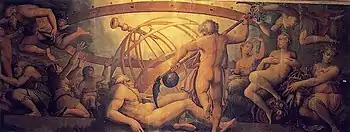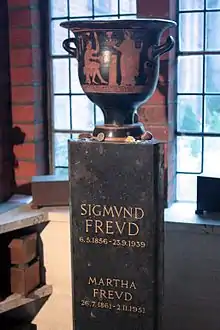 The Castration of Ouranos by Kronos: shows a scene the ancient Greeks themselves found shocking. The fear of castration is so strong in males that people wince in seeing or hearing about it. Likewise, the power of this myth may be in part due to the fact that the desire to kill or harm a family member is strongly taboo. This fresco by Giorgio Vasari and Cristofano Gherardi, c. 1560 is in the Sala di Cosimo I, Palazzo Vecchio.  The Greek vase with Sigmund Freud's ashes in the Golders Green Columbarium is an indication of his strong connection to Greek culture and myth. The psychologist Sigmund Freud used Greek myths such as the story of Oedipus to help explain his theories of psychosexual development. Freud believed that people have strong desires that are taboo, i.e. that society prevents them from expressing. For example, the story of Oedipus includes incest and patricide. Freud saw that most societies had these taboos against incest and patricide, but many if not most also had myths and legends that included these taboos. For Freud, taboo desires and fears expressed themselves in dreams or in myths. One need not believe in all or any of Freud's ideas about the interpretation of dreams or psychosexual development to accept that stories often reflect unconscious, forbidden desires and fears. A Freudian definition of myth would be:
This simplified Freudian approach makes a claim about what types of stories appeal to an audience. Stories with taboo desires or fears are the types of stories that sell and are passed on to the next generation. Besides Oedipus, a good example of a classical myth that is open to Freudian interpretation is the story of the castration of Ouranos, the Sky.
The passage in the reading revels in the taboo desires to harm one's children, to harm one's spouse, to harm one's parent. It also has the taboo fear of being castrated, being hurt during sex, being hurt by one's spouse, hurt by one's child, or replaced by one's child. Theories of Myth Interpretation
References
|
